Jennie Goutet's Blog: A Lady in France, page 9
June 19, 2017
God Gives Grace
I wish my husband had a blog because I love what he reveals about God from his time spent in the Word. I’ve asked him to guest post on A Lady in France and he’s considered it, but the truth is he’s pretty swamped with work, and when he prepares something (a message or Bible discussion or a written study), he spends a lot of time in reflection first. And loads of time is in short supply. But I’ve the next best thing here because I’m going to share with you the discussion he did Friday night.
Our Friday night Bible Talk has 5 regular couples besides us (with kids in tow) plus 3 couples who come semi-regularly, and then the odd visitor that wants to check it out. We feed the kids first then send them to play. Then we open the Bible and Matthieu asks the questions he’s prepared and we discuss it, then we all eat a copious fare prepared by talented cooks. It’s a win all around.
This past Friday night he wanted to focus on the story of two pregnant women because in our group there are two pregnant women – one about to give birth, and the other, four months behind. (Almost the interval between Elizabeth and her young cousin, Mary).
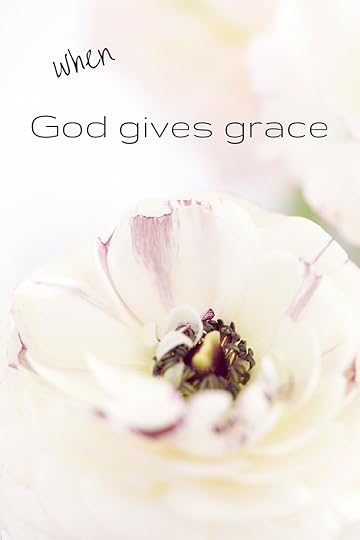
The passage is in Luke 1, and since it’s a long passage, I’ll highlight some of the words to help them stand out.
5 In the time of Herod king of Judea there was a priest named Zechariah, who belonged to the priestly division of Abijah; his wife Elizabeth was also a descendant of Aaron. 6 Both of them were righteous in the sight of God, observing all the Lord’s commands and decrees blamelessly. 7 But they were childless because Elizabeth was not able to conceive, and they were both very old.
8 Once when Zechariah’s division was on duty and he was serving as priest before God, 9 he was chosen by lot, according to the custom of the priesthood, to go into the temple of the Lord and burn incense. 10 And when the time for the burning of incense came, all the assembled worshipers were praying outside.
11 Then an angel of the Lord appeared to him, standing at the right side of the altar of incense. 12 When Zechariah saw him, he was startled and was gripped with fear.13 But the angel said to him: “Do not be afraid, Zechariah; your prayer has been heard. Your wife Elizabeth will bear you a son, and you are to call him John. 14 He will be a joy and delight to you, and many will rejoice because of his birth, 15 for he will be great in the sight of the Lord. He is never to take wine or other fermented drink, and he will be filled with the Holy Spirit even before he is born. 16 He will bring back many of the people of Israel to the Lord their God. 17 And he will go on before the Lord, in the spirit and power of Elijah, to turn the hearts of the parents to their children and the disobedient to the wisdom of the righteous—to make ready a people prepared for the Lord.”
18 Zechariah asked the angel, “How can I be sure of this? I am an old man and my wife is well along in years.”
19 The angel said to him, “I am Gabriel. I stand in the presence of God, and I have been sent to speak to you and to tell you this good news. 20 And now you will be silent and not able to speak until the day this happens, because you did not believe my words, which will come true at their appointed time.”
21 Meanwhile, the people were waiting for Zechariah and wondering why he stayed so long in the temple. 22 When he came out, he could not speak to them. They realized he had seen a vision in the temple, for he kept making signs to them but remained unable to speak.
23 When his time of service was completed, he returned home. 24 After this his wife Elizabeth became pregnant and for five months remained in seclusion. 25 “The Lord has done this for me,” she said. “In these days he has shown his favor and taken away my disgrace among the people.”
Zechariah and his wife were righteous, and they observed all of God’s commands and decrees blamelessly, yet they were without child and already very old. When the angel came to Zechariah, he said, “your prayer has been heard”. Not “your prayers have been heard.” One prayer. What do you think that one prayer had been all those years? (Matthieu clarified that this doesn’t mean he prayed for it one time, but rather that it was the prayer – his central desire).
The answer? To have a child.
Gabriel announced that they would, indeed, conceive and went on to say all the amazing things that would come with this child – filled with the Holy Spirit, bring people back to God, go in the spirit and power of Elijah, many will rejoice because of his birth. All amazing things, right? But apparently, the presence of an angel in the quiet, sacred part of the temple where no other human was allowed, apart from the one chosen by lot, was not enough to convince Zechariah that all this was going to happen, that what the angel said was true. Because he asked, “How will I know?”
And what was Gabriel’s response? Well, it seems here he was shocked. Indignant. Look, mister, he seems to say. I stand before God. I see his face. What he says will happen will happen. How can you doubt? And Gabriel strikes him mute for his lack of faith until everything he says will happen happens.
Meanwhile, Elizabeth did become pregnant, and then we come to the next part of the story.
26 In the sixth month of Elizabeth’s pregnancy, God sent the angel Gabriel to Nazareth, a town in Galilee, 27 to a virgin pledged to be married to a man named Joseph, a descendant of David. The virgin’s name was Mary. 28 The angel went to her and said, “Greetings, you who are highly favored! The Lord is with you.”
29 Mary was greatly troubled at his words and wondered what kind of greeting this might be. 30 But the angel said to her, “Do not be afraid, Mary; you have found favor with God. 31 You will conceive and give birth to a son, and you are to call him Jesus. 32 He will be great and will be called the Son of the Most High. The Lord God will give him the throne of his father David, 33 and he will reign over Jacob’s descendants forever; his kingdom will never end.”
34 “How will this be,” Mary asked the angel, “since I am a virgin?”
35 The angel answered, “The Holy Spirit will come on you, and the power of the Most High will overshadow you. So the holy one to be born will be called[b] the Son of God. 36 Even Elizabeth your relative is going to have a child in her old age, and she who was said to be unable to conceive is in her sixth month. 37 For no word from God will ever fail.”
38 “I am the Lord’s servant,” Mary answered. “May your word to me be fulfilled.” Then the angel left her.
So what’s interesting in this story (besides the crazy fact that God came down to earth in human form, and that He decided to do it as a helpless baby) is that He announces this incredible news to Mary. Keep in mind that after the last prophet in the Old Testament – Malachi – there were 400 years of silence. Four hundred years where none of God’s people heard any new revelation. And now the angel announces that she will have a son, and He will be called the Son of the Most High – that He will reign on David’s throne, that his kingdom will never end. Absolutely incredible. Of course it beggars belief and we can see that Mary felt the same way. What was Mary’s response? Why, the same as Zechariah!
How can I be sure of this? How will this be?
But what’s interesting is, this time the angel didn’t strike her mute. Same angel. Same human response. But the angel reacts differently. Instead he explains how it will be done, that the Holy Spirit will come on her, that she won’t be alone because even her cousin will have a child, (and I know it’s difficult for you humans to believe, but) God’s word never fails.
So, why do you think Gabriel responded to her incredulity in a different way?
One person responded that it was because Zechariah had been praying for it. It wasn’t news being announced out of the blue. If he was asking for it, he should have believed when his prayer was answered. But in Mary’s case, the angel came when she hadn’t asked for anything. She needed more explanation, more guidance.
I hadn’t thought of that. My first reaction was similar to Matthieu’s. He could imagine Gabriel reporting back to God (mission accomplished. announced the good news). And God saying, really Gabriel? You struck him mute? Could you not have shown a little more grace? Some more compassion because Zechariah does not, in fact, stand in my presence and see my face? Perhaps Gabriel got schooled by God and it was because of that he came six (plus) months later with an attitude more adapted to humans.
In any case and for whatever reason, when Gabriel came back to announce the news to Mary, it was done in a manner that showed much more patience and grace than before.
Now let’s look at the closing passage as it pertains to this story. Not the one about Jesus’ birth, which deserves its own focus, but rather on Zechariah and his son.
57 When it was time for Elizabeth to have her baby, she gave birth to a son. 58 Her neighbors and relatives heard that the Lord had shown her great mercy, and they shared her joy.
59 On the eighth day they came to circumcise the child, and they were going to name him after his father Zechariah, 60 but his mother spoke up and said, “No! He is to be called John.”
61 They said to her, “There is no one among your relatives who has that name.”
62 Then they made signs to his father, to find out what he would like to name the child. 63 He asked for a writing tablet, and to everyone’s astonishment he wrote, “His name is John.” 64 Immediately his mouth was opened and his tongue set free, and he began to speak, praising God. 65 All the neighbors were filled with awe, and throughout the hill country of Judea people were talking about all these things.66 Everyone who heard this wondered about it, asking, “What then is this child going to be?” For the Lord’s hand was with him.
Do you know what Zechariah means in Hebrew? It means, God remembers. Zechariah’s friends urged him to call his son Zechariah. God Remembers. Of course they wanted him to name his son that. Not only because it would carry on the tradition of father-son naming, but don’t you see, Zechariah? God saw your righteousness and he remembered. All those years you stayed faithful though you didn’t get what you wanted, and God saw that. And he gave you a son. Every time you speak his name, you will think of this. God remembers because He remembered you.
But no, that would not be his name. Zechariah asked for a writing tablet, and wrote, “His name is John.” Do you know what John means in Hebrew?
God gives grace.
By obeying the angel, Zechariah was saying not by my righteousness was my heart’s desire granted. Not by my righteousness was my prayer heard. Not by my righteousness did God remember me. Only – only – was my heart’s desire granted because God gives grace.
And because he showed his faith, his mouth was opened and he could speak. Notice, in verse 20 in the NIV it says you won’t be able to speak until the day this happens. But in the King James (and the Louis Segond French version we were reading) it says you won’t be able to speak until these things have happened. It doesn’t say you won’t be able to speak until your son (John the Baptist) is born. It says until these things – he brings people to the Lord, he goes in the power of Elijah, he makes ready a people prepared for the Lord – until these things will happen.
But because of God’s grace, He didn’t even wait for all these things to happen before He gave Zechariah speech. God just gave grace and allowed Zechariah his speech at the first act of faith following the birth of his son.
God gives grace.
You know, the New Testament was written years after it happened (by three of his disciples, the apostle Paul, a Greek doctor, a Roman citizen, a few unknowns, and – as is commonly accepted- by two of Jesus’ blood brothers). So it took time for people to step out of the current events that shook the world, and be inspired to put pen to paper and write about it. But, if you think about it, know what the first real words of the New Testament are, written before Jesus was born?
They’re the ones Zechariah wrote when he asked for a tablet. “His name is ‘God gives grace‘.”
And if you look at the very end of the New Testament, know what the last words are in Revelations 22:21? “The grace of the Lord Jesus be with God’s people.” God gives grace. In perfect harmony, the New Testament begins – and ends – with God’s grace.
To Him be the glory.

If you’d like to read more of my faith posts, you can get an index of topics here!
The post God Gives Grace appeared first on A Lady In France.
June 12, 2017
French Chocolate Cake
I’ve been meaning to make this French chocolate cake recipe – a naturally gluten-free cake, I might add – for eight years now. About the length of time I’ve been blogging. I’m not sure why I haven’t yet. Maybe because there are so many fun French recipes and this one got lost in the shuffle. In any case, I’ve been serving it on a regular basis, ever since my mother-in-law gave me a photocopy of the recipe card from her French Elle magazine. The recipe is attributed to Madeline Peter.
Chocolate cake. Can’t go wrong here, right?

Here’s what you need, more or less. Missing is the confectioner sugar and an extra 25 grams of dark chocolate, but it’s all simple, fresh ingredients.

Before you start, you should pre-heat the oven to 200-220° C (6 and 7 range) or 400-425°F. The oven needs to be hot and the time it takes you to make the cake is enough time for it to be at the right temperature.
You also need to set the butter out so it’s very soft, but not melted. The whole recipe calls for 250 grams of butter, but you’re supposed to save 50 for the frosting (glaçage). That can be tough to remember in France since butter is sold in 250g, and I’ve dumped the whole thing in the cake part before, then had to add more for the frosting and it was just too much. I’ve put a butter conversion in the printout.
Finally, get a deep-sided quiche pan (24 cm) and butter it well. Cut out parchment paper and put it on the bottom of the pan, then butter that as well. Finally, sprinkle sugar on it so it coats the entire bottom and sides. Like so (sugar coating not shown here).
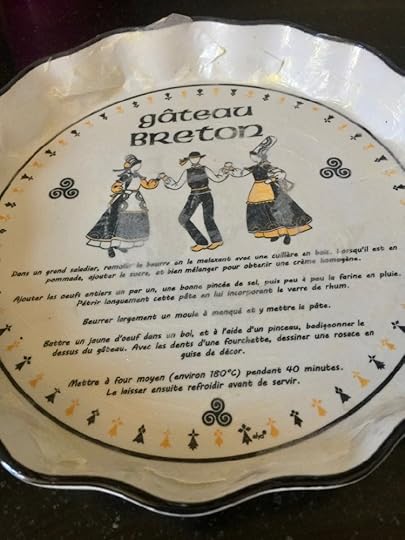
You need six eggs with the yolks separated, but you only need three of the six egg whites. So this is what I do (so I don’t forget). I get out three containers and put the yolks in a big bowl, the 3 whites in a smaller bowl, and the remaining three directly in a Tupperware.

I usually mix the three whites first so I don’t have to wash the beaters. You probably know this, but if any yolk gets into the whites they won’t beat into stiff peaks. Salt helps them to form those peaks so I put several dashes of sea salt into the whites since there’s no other salt in the cake.

When that’s done, combine the 6 yolks with 1 1/8 cups of sugar (I’ll put the grams in the printout). You have to beat that together until they start to turn white and “fassent le ruban“. Until it leaves ribbons in its wake. It sort of looks like this.
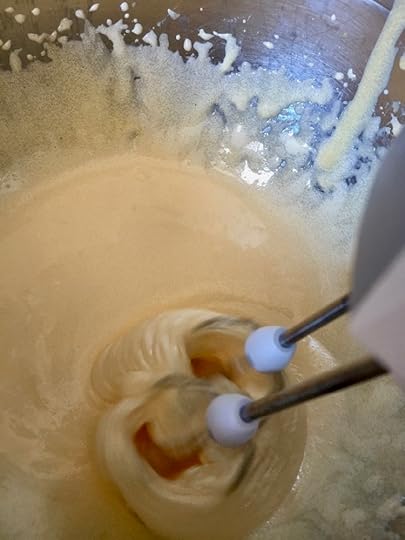
Meanwhile, you want to melt chocolate. 250 grams of baking chocolate, which for me means Lindt 60%. You can use a double broiler, but I usually microwave it for 1 minute, give it a stir, then add another 15 seconds or so if there are still lumps. Pour it into the yolk / sugar and mix immediately to even out the temperature.
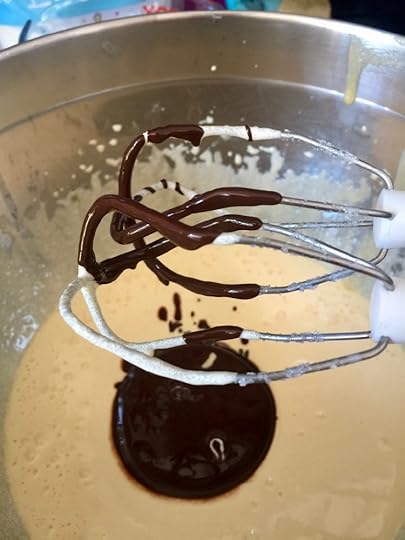
Don’t, for heaven’s sake, do what I did and stop to take a photo.
Your mixture will be very thick, but you still need to add the ground almonds (1 cup or 100 grams), the 3 tablespoons of corn starch, the 1/2 teaspoon of baking powder, and the teaspoon of vanilla, which I didn’t have so I left it out. If you’re making this for someone who is intolerant to gluten, don’t forget to check that your baking powder is gluten-free. Many commercial brands in the States are these days. Now it’s super stiff and hard to beat – like this.
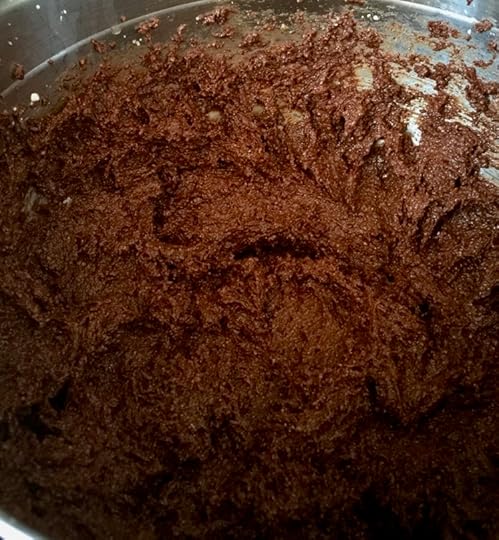
Then it’s time to fold in the egg whites. Put your mixer aside. You’re going to use a spatula.
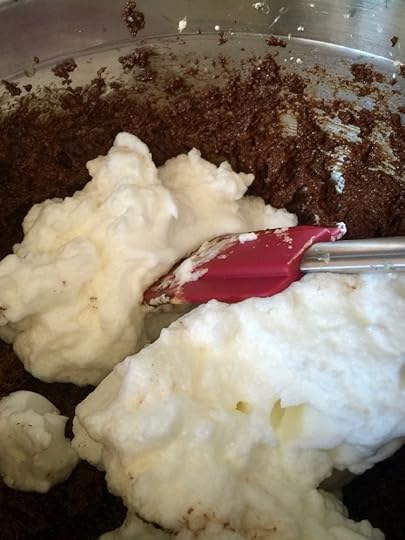
You’re not supposed to break the egg whites, and when I first made this I was so hesitant to over-mix I actually left streaks of egg white in the batter. Don’t do that. Mix thoroughly so you don’t see any more white.
It looks like this.
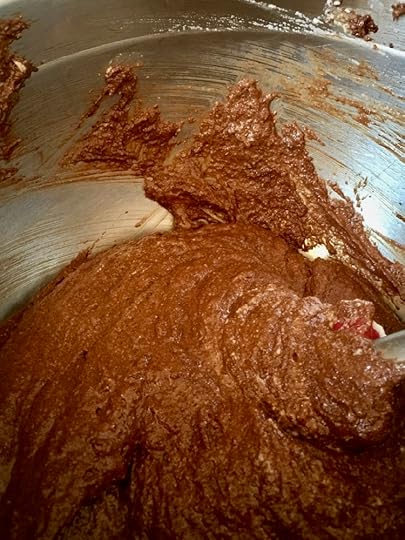
Pour it into the pan.
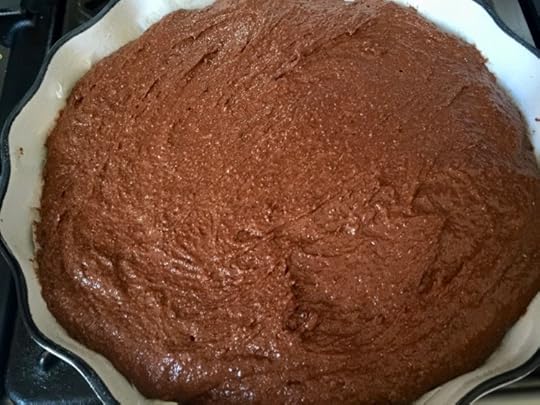
Slip it into the oven for 25-30 minutes. You need to know your oven. I chose the lower temperature of the two and set the timer for 17 minutes to turn the cake so it would bake evenly. And I cooked it for 25 minutes, not 30.
You should still have some batter clinging to the knife when you take it out. Like so.

Let it cool in the pan for a half-hour or so, then take a large plate (platter) and put it on top of the quiche pan. Holding the plate and pan together, flip it upside down so the cake settles on the plate. With the butter, parchment paper, and sugar, it really shouldn’t be a problem to flip the cake. Remove the parchment paper, obvs.
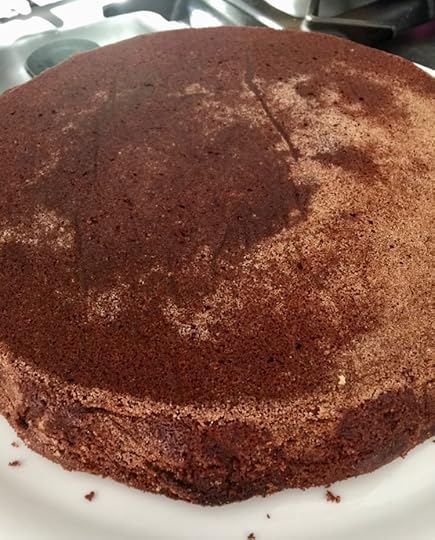
Time for the glaçage! (Pronounced glah-sahje). Truthfully, you don’t really need it. It’s sweet and tasty enough. But it make the cake beautiful and gives it an even fudgier taste and texture.
Melt the remaining 50 grams of butter and 125 grams of dark chocolate . They call it “à croquer” – which means, good enough to munch on. I use Lindt as well. Usually the 52% because that’s what we eat, but I think the 70% might be a better choice.
Once again, I put the butter and chocolate in the microwave for a minute. (Cover it in case the butter explodes). That’s usually enough. I add 2/3 cup of confectioner sugar a couple spoons at a time, and though the recipe doesn’t call for it, I add a tablespoon or two of milk so I can stir it. Otherwise it won’t spread easily.
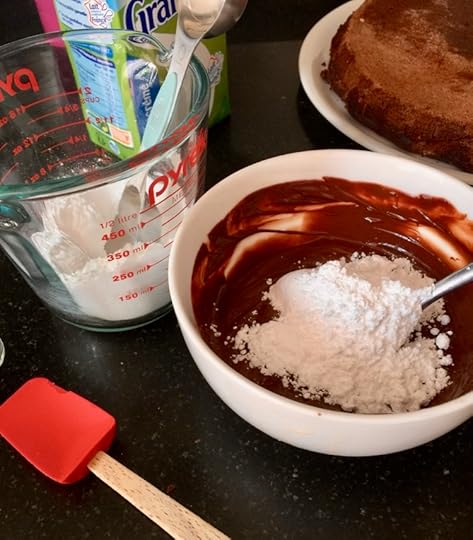
Then spread it on the top and sides while the frosting is still warm. You can put it in the refrigerator before you serve to help it get a firm and smooth surface, but take it out a half-hour before you serve.
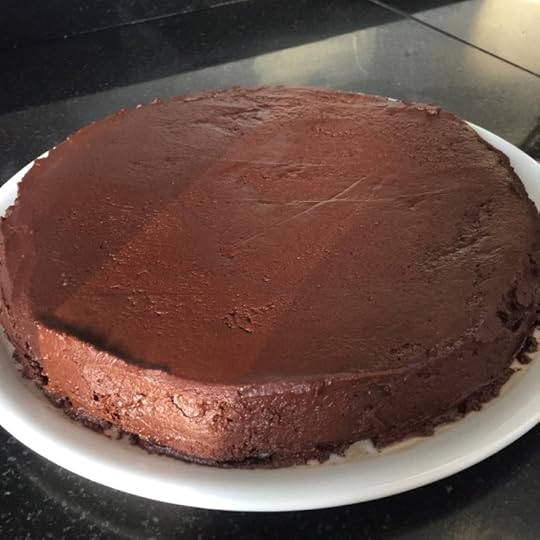
I am a chocolate fiend – I love it – but this is so rich I can’t eat a full piece if it’s cut too large. So keep the slices small. Trust me on this. This is the only thing I’ve ever made where one piece is more than enough.
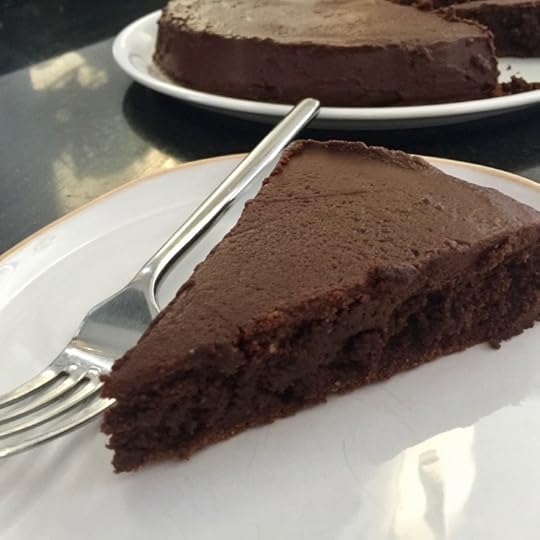
And there you have it. A French, naturally gluten-free cake that’s pretty much like what you’d find in any bakery.
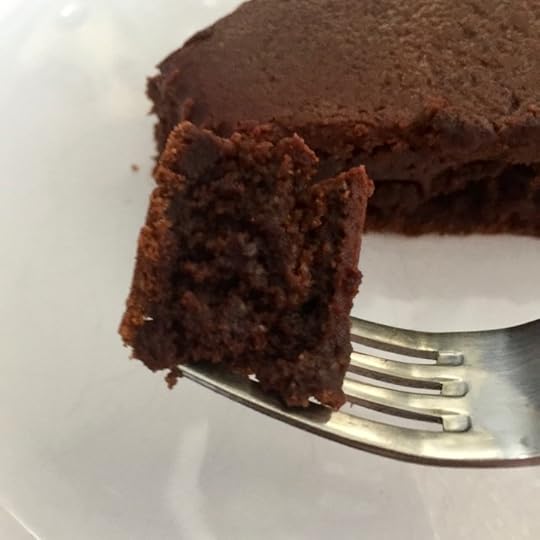
Except maybe better.
French Chocolate Cake Print Prep time 1 hour Cook time 25 mins Total time 1 hour 25 mins From: Madeline Peter Recipe type: Dessert Cuisine: French Serves: 12-16 Ingredients 250 grams soft butter, split 200 for cake, then 50 for topping (or 1¾ stick / 14 tablespoons butter for cake, then 3½ tablespoon butter for topping) 6 eggs, split, using 6 yolks and only 3 whites a few dashes of salt 250 g sugar or 1⅛ cup 250g baking chocolate 60% 100 g ground almonds, or about 1 cup 3 tablespoons Maizena (corn starch) 1 teaspoon vanilla (opt) ½ teaspoon baking powder Frosting: the remaining butter - listed above 125 g chocolate 70% 1-2 tablespoons milk (opt) Instructions Preheat the oven to 200-220°C or 400-425°F (Make sure butter for recipe has been sitting out and is nice and soft) Butter the quiche pan and put parchment paper on the bottom. Put butter on top of that, then sprinkle sugar on bottom and sides and shake out excess. Separate the eggs and first mix the 3 whites in one bowl, with several dashes of salt until stiff. Then mix the yolks and sugar in a bigger bowl until it turns white. Add the ground almonds, corn starch, baking powder and vanilla and mix that in. Put aside the mixer and fold the whites into the batter using a spatula. Mix well, but stop as soon as you don't see any more whites. Pour into pan and bake for 25-30 mns. Let it cool for a half hour, then flip over onto plate. Melt the chocolate and remaining butter and add the confectioner sugar (and if desired, the milk to help make it easier to spread). Cover the cake carefully with the topping. You can refrigerate, but take out an hour before eating. Cut small slices and enjoy! 3.5.3226
If you’d like to see more (mostly French) gluten-free recipes, visit my recipe page here.

The post French Chocolate Cake appeared first on A Lady In France.
June 7, 2017
My Thoughts on Spiritual Obedience
This week’s post was supposed to be a cherry clafoutis recipe, but my French friends told me the clafoutis was not all that great, which is no less than I thought myself, so instead I’m writing a post on spiritual obedience. Next week I’ll post a recipe for this delicious, naturally gluten-free, fudgy chocolate cake that my mother-in-law gave me, and which I’ve been meaning to post about for years.
I’ve studied the Bible with many people over the course of the past 2 decades. After I was converted, I learned to teach by sitting in on studies led by others, and before long I started teaching, myself. Let me tell you something, teaching the Bible to people who come from all backgrounds is a refining experience. No two people are alike and each presents different arguments, questions, and sticking points that force you to dig deep into the Bible in order to answer in a way that is scripturally true. This post comes out of my wrestling with the scriptures, and if you find you’re not in the mood today for teaching / exhortation (which I totally understand – it’s such a personal thing, isn’t it?) well then, come back for the cake!
One of these arguments / sticking points I often come across is variations in understanding the concept of obedience, or what it really means to make Jesus Lord. Biblically, this happens when we first become a Christian and repent, dying to our old lives. This is like the levitical sacrifice of a young bull for the burnt offering – we offer up our entire selves as we shed the obvious acts of the sinful nature (Galatians 5:19-20) and replace them with obedience to Christ. What follows for the rest of our lives is akin to the levitical fellowship offering. We strive to make Jesus Lord in all the areas of our lives on a daily basis. We’ve already offered ourselves up once and for all. But every day we must wake up and decide to obey.
One day, I want to talk about my own daily walk with God and how I’ve grown (and still need to grow) in obedience and in making Jesus Lord. It’s exciting, really, because it feels like an adventure with God even though most of the growing pains are … painful. But for the purpose of length, I’ve decided just to focus on the call to obedience when we first become a Christian and save my story for another time.
From the variety of studies I’ve participated in, I can see that not everyone views obedience the same way. As I address the issue, I want to make it clear that it’s not intended to pass judgment. In spiritual disagreements, I cling to Philippians 3:12-16 (condensed here).
Not that I have already obtained all this, or have already arrived at my goal, but I press on to take hold of that for which Christ Jesus took hold of me. All of us, then, who are mature should take such a view of things. And if on some point you think differently, that too God will make clear to you. Only let us live up to what we have already attained.
Instead, I hope to offer some points to consider regarding obedience if, on some things, you think differently. In the end, it’s God who makes it clear.

One of the problems I see with conversion by – what is often referred to as – “The Sinner’s Prayer” (or praying Jesus into your heart, or conversion by alter call), is that you’re not taught to be a disciple first. And therefore you’re not taught how to obey before you make the life-altering decision. I don’t downplay the sincerity of a person calling out to Jesus in this moment of his or her life, or its life-changing possibilities. I certainly don’t deny the fact that God is working in a person’s life in that moment to bring them to repentance and faith in Jesus Christ. It’s just that I’ve observed, after the fact, that with many, the conversion is incomplete.
In my interactions with people who’ve been converted this way, they often describe it as “when I accepted Jesus as my Lord and Savior”. And the two terms are lumped together as one. While that’s true – He is both Lord and Savior, viewing them as as a joint-description can water down the lordship part. Also, when you think about it, you can’t really accept a lord, any more than you can accept a king. Either you choose a lord – you make him lord because of your love and respect for him, and out of undying fealty. Or he becomes your lord by force. (As in how the scriptures say, one day every knee will bow to Jesus).
I love Timothy Keller’s podcasts, and yesterday I was listening to one called “Spiritual Warfare”. In it, he talked about temptation and accusation, both of which are tools Satan uses to distract us and pull us away from God. Temptation is when we downplay God’s holiness and exaggerate our own consequence. This causes us to sin with reasoning like:
I’m only human and it’s God’s job to forgive us anyway (ex: so I’ll sleep with my fiancé – we’ve already committed to being together anyway. Not yet being married is just a technicality)
or – you don’t know how hard I work. I deserve this (ex: why politicians have affairs, or … to be perfectly honest … why I eat too much sugar when I’m entertaining – I am really working on this)
or – it’s not a big deal in the scheme of things. I basically follow the Ten Commandments so I’m a good person (everyone streams TV shows illegally – it doesn’t hurt anyone)
It’s what causes a mafia guy to think he’s right with God. Does he not loves and honour his mother? So what if he kills a few people? That example might be laughable (though true), but this is what causes us to practice things like tax evasion (I probably won’t get caught, and the government takes out too much anyway). Or … I can probably have another drink. Sure, sometimes I don’t remember what happened the next day, but most of the time I can stop. Or … I’ll just watch this one porn video. It’s not my fault it popped up on my screen. Or .. so what if I curse. It’s cute coming from a holy person like me.
In giving in to temptation, (and this is sort of a dangerous thing to say because God IS love and he DOES love us), but in giving in, we play up God’s love for us. We convince ourselves that God loving us means he’ll turn a blind eye to our sin. In any case, that’s what Jesus died for, we tell ourselves.
Accusation, says Keller, is when we downplay the worth we have in God’s sight and exaggerate his judgement. This leads to guilt, which has no place in our relationship with God unless it’s in those few moments when we’re convinced we’ve sinned and follow it up with radical repentance. I won’t spend too much on this because this doesn’t generally deceive us regarding obedience.
Lordship, discipleship, obedience … seeing temptation for what it is … these don’t come easily. That’s why Jesus says in Matthew 28:18 that we need to go into all nations and MAKE disciples. People need to be taught how to make Jesus Lord before they can decide to make him Lord. They need to count the costs on whether they can see it through to the end (Lk 14:28). You can usually tell how much a person has made Jesus Lord by how teachable (or how defensive) they are. Those who receive Jesus’ Word like a child are usually the ones who have made him Lord.
God didn’t design conversion to be an individual thing, yet so many people teach it like that. If you look at all the conversion stories in the book of Acts (the early church) it always started with disciples teaching a person, then baptising them after they understood that Jesus was Lord. Coming back to Matthew 28, this is the plan Jesus laid out. After making disciples, he says, we are to baptise them in the trinity, then stay in their lives to teach them how to obey.
Obedience is important to Jesus. We can’t make him Lord unless we obey. Consider Jesus’ own obedience (in Philippians 2:8-11):
And being found in appearance as a man,
he humbled himself
by becoming obedient to death—
even death on a cross!
Therefore God exalted him to the highest place
and gave him the name that is above every name,
that at the name of Jesus every knee should bow,
in heaven and on earth and under the earth,
and every tongue acknowledge that Jesus Christ is Lord,
to the glory of God the Father.
He obeyed by dying. And though he usually doesn’t ask that of us, can we not obey by giving up something that’s inconvenient to give up?
Consider the things Jesus said about obedience:
“In the same way, those of you who do not give up everything you have cannot be my disciples.” Luke 14:33
Jesus replied, “No one who puts a hand to the plow and looks back is fit for service in the kingdom of God.” Luke 9:62
Jesus replied, “Anyone who loves me will obey my teaching.” John 14:33
“If you keep my commands, you will remain in my love, just as I have kept my Father’s commands and remain in his love.” John 15:10
“You are my friends if you do what I command.” John 15:14
I know this is hard-core faith stuff for a little lifestyle blogger like me. If I wanted a bigger following I should just stick to chocolate cake recipes and pictures of the Eiffel Tower, right? But sometimes things like this bubble up inside me until they find expression because they’re so important. A person can miss out on true life-change, or potentially even salvation because of inaccurate or incomplete teaching on spiritual obedience.
If you’ve found that this strums a cord in you – if there are areas of your life where you know the good you ought to do and you’re not doing it, or where you know Jesus is not Lord over a certain thing, and you must make the decision to obey – let me encourage you with Hebrews 1 to throw off everything that hinders, and the sin that so easily entangles. After all, the best way we can show our love for Jesus is to obey his teaching.
Therefore, since we are surrounded by such a great cloud of witnesses, let us throw off everything that hinders and the sin that so easily entangles. And let us run with perseverance the race marked out for us, fixing our eyes on Jesus, the pioneer and perfecter of faith. For the joy set before him he endured the cross,scorning its shame, and sat down at the right hand of the throne of God. Consider him who endured such opposition from sinners, so that you will not grow weary and lose heart.

You can read more posts on faith here!
The post My Thoughts on Spiritual Obedience appeared first on A Lady In France.
May 29, 2017
A Jam-Packed, Joy-Filled Life
Thursday was the day of Ascension, a public holiday in France. We had the day off, then the school system took off the Friday as well to make a long weekend. It’s called le pont – the bridge. This was such a jam-packed, joy-filled four days of utter exhaustion and bliss I thought I would share the stories and photos with you.
Thursday was the calm before the storm. All I had to do was make hydrangea cupcakes for a bachelorette party, then drive through Paris to get there. Upon my return, I needed only hold the fort while Matthieu went to the stag party. (Mild, both of them, as these were church friends).
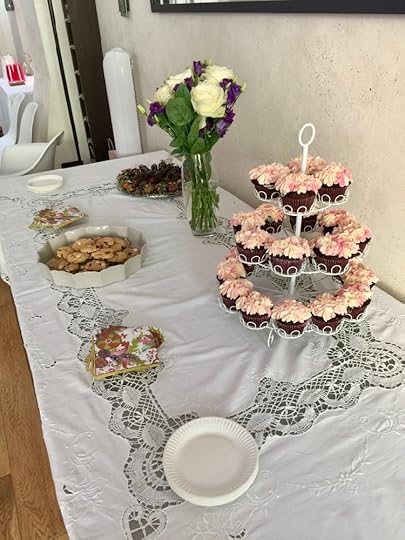
The couple getting married are children of friends of ours. But since they got started early on as a family, and we got started late here we are attending our friends’ children’s wedding. The couple is mixed English-French and they became Christians in Boston a couple decades ago. Their son, Pierre, married Debbie, the daughter of a family in the Boston ministry (but the two sets of parents had not met back in the day). She had come here to study abroad, and although Pierre was in Sweden working, they ended up meeting in four different countries in rapid succession through mutual friends. And the rest is history.
That’s for the background. Thursday was a blast. Friday, I had two Bible studies scheduled, plus a lunch in between. And since the kids had off school, they played together while we studied. For one of the two people, we were preparing for her baptism by counting the costs (this comes from Luke 14:25-33). Like Thursday, this was also a relatively calm day, despite the Bible studies and extra kids.
On Saturday, things started to get heated, beginning with the weather. I went to our town hall to meet a friend who is building her portfolio as a photographer. We found a few places to take official photos for my blog and next book.
 Then we came home and finished the photo shoot here. She’s also expressed interest in doing a cooking photo shoot so that there are photos of me cooking, alongside the food. We’ll be setting up a time to do all that. And I’ll share the best photos with you when I get them. It was a great experience.
Then we came home and finished the photo shoot here. She’s also expressed interest in doing a cooking photo shoot so that there are photos of me cooking, alongside the food. We’ll be setting up a time to do all that. And I’ll share the best photos with you when I get them. It was a great experience.
Then it was time for the wedding.
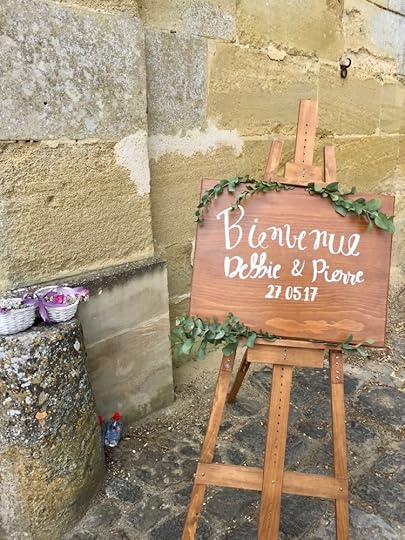 It was held in a chateau less than an hour from us.
It was held in a chateau less than an hour from us.
 It was so brutally hot, I was happy to see that they handed out straw hats and fans, along with bottles of water as the guests entered. The setting could not have been more perfect.
It was so brutally hot, I was happy to see that they handed out straw hats and fans, along with bottles of water as the guests entered. The setting could not have been more perfect.
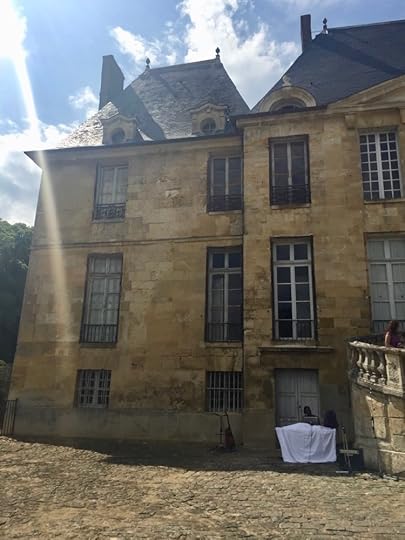
The bridesmaids wore plum, and the groom danced his way down the aisle.
 And they got married.
And they got married.
I promised my friend I would be responsible for keeping an eye on the kids so we set up a rotation of parents to focus specifically on that. Everyone was wilting under the heat –
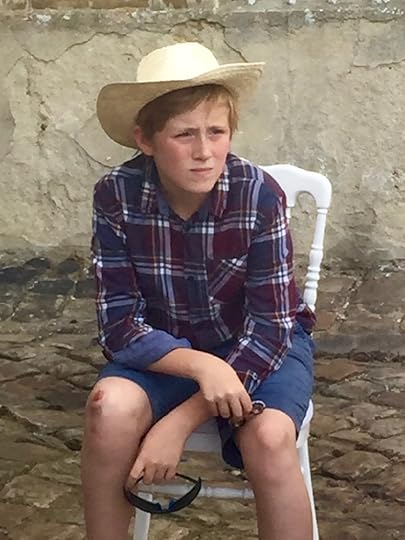
but once the ceremony was over, we stuck to the shade and gulped down glasses of cold beverages at the cocktail hour. The reception was held inside a cool room that was once a stable.

The food, music, and company was exceptional. And by the time we got home and in bed, it was after one in the morning.
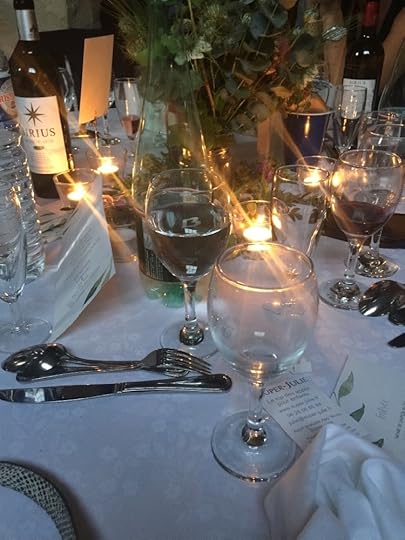
The next day, I was up at 7:30 because we were hosting house church, which we do at least once a month. I knew we were getting a lot of unexpected guests, so I wanted to cook extra food. There was someone visiting from Halifax, a couple from Indiana (she’s half-French) who will be moving to Lyon to work in the ministry. There were our usual mix of Australian (Samoan), Malgash, La Réunionaise, French, American, and a (welcome) invasion of Indonesians. For once, the service was in English and I translated in French for those who couldn’t follow. Usually it’s the reverse.
And this is really the story I wanted to share with you – this jam-packed, joy-filled day. There were 3 couples from Indonesia, including one couple’s 2 daughters, in addition to our Indonesian friend who lives here and is a close friend of mine. My husband asked Harlam to give the message since he leads the churches in Indonesia. (I go to the Paris branch of the International Churches of Christ and we have a sister church in the big cities all around the world).
Harlam’s message was just great. But what was so neat is that I met his wife, Vania, in 1998 when I went on a business trip to Jakarta. She met me in my hotel lobby and I treated her to dinner, though she could easily have stayed at home with her young children. But she wanted to make me feel welcome.
This was the time of the riots and massacres of Christians in Jakarta and our dinner was so memorable, I mentioned her in my memoir. It was then incredible to have her in my home nearly 20 years later. She didn’t remember meeting me because she did this often for people passing through, but she did ask for a signed copy of my memoir, which I happily gave her.
So back to Harlam. His message was on how, often Christians are content for Jesus to be a good, moral teacher, but not content for him to be Lord. And this is why people don’t stay faithful in the long run. They can be diligent in reading the scripture because it has such good moral teaching, but the minute things get confusing or hard, they don’t stick around. It was the same with his disciples. When Jesus said, “I am the bread of life” and again, “unless you eat the flesh of the Son of man, and drink his blood you have no life in you” people turned away because it didn’t fit into the teaching of a good, moral person. Peter, on the other hand, knew Jesus was Lord and on that faith he was able to walk on water.
When Harlam was sent to Indonesia to start a church, even other ministers in the fellowship set the bar low. They said, “It’s hard to start a church in Indonesia, since it’s predominantly a Muslim country. The people aren’t open. If you can get even 100 disciples, that’s already a victory.” At first, because he believed it was impossible, they never had any visitors. But when he started to focus on the splendour and lordship of Jesus, he turned that around, even if that included enduring death threats and getting beat up by his neighbors. Now there are 34 churches throughout Indonesia, with thousands of disciples, and they send out 3-4 mission teams per year.
One of the two couples that was there yesterday, Harlam and Vania had traveled with. But there was another couple present from Indonesia (visiting Paris) that they knew very well, and who had also been to our house once before. So Harlam decided to have them give a testimony, and he introduced them by sharing a bit about the husband. He said that 8 years ago, when his friend told him who it was who wanted to start studying the Bible, he started to tremble. Together, he and his friend Kiki, scoured google for everything there was on the man so they would be prepared to study with him. And they knew that in doing so, they were taking their lives in their hands.
Suryo was head of the Indonesian mafia.
How. HOW did such a man become a Christian? A man whose hands were bloody, who was in league with every corrupt official in the country, who had hundreds of illegal businesses and spent over $500,000 on himself each month? How?
Ha. Short answer. Because Jesus is Lord and is nothing is too hard for him. No one is beyond his reach. Longer answer is because Suryo came to the realisation that God must be greater than the president (whom he was friends with) and so he wanted to get to know him. He figured God deserved respect, whoever He was. When Suryo found out his neighbour was studying with Kiki, he wanted to study too.
His counting the costs was getting rid of every illegal activity, and confessing and repenting of every sin he had ever done. His wife (who trafficked weapons from Eastern Europe) followed suit. They lived on $5 a day until they could get an honest business going. And eight years later, he gets up every day at 3:30 in the morning, dresses up, and prepares to meet Jesus, who (he says) deserves his respect.
When the Indonesians left right before lunch, it felt like we had just hosted angels.
The baptisms happened after lunch. Jesse and Lei, a Samoan-Australian couple have been studying the Bible. Jesse is a pro-rugby player, and they were met by Paul and Scarlett who are also here for pro-rugby (and are also from Australia).

It was another brutally hot day and I had been on my feet, cooking, translating, welcoming … but we all stopped to watch them get baptised. And everyone cheered and sang when they came up from the water.

(If you’re curious about the scriptural basis for adult baptism, you can read about it here).
When people left at 7:30 that night (after gobbling up the rest of the food), we were finally able to celebrate French Mother’s Day. My kids made me sweet things.

They each gave me a pair of earrings, which I’m wearing on different days this week. (When I picked the boys up from school, they wanted to see which pair I had on). I rocked on the garden swing in the shade and opened the gifts, and listened as they each said what they liked about their maman.
I had asked Matthieu to take them to buy flowers for me that we could plant together for Mother’s Day. And I asked for at least one hydrangea.

So that’s what we did.
I didn’t know I would want this life. I couldn’t have imagined this life full of adventure and joy and exhaustion – that it would be the one for me! I didn’t know I would want a life where Jesus meant more to me than a teacher presenting a good moral code. That I would want him as my Lord and my friend.
But I did. And God knew, before I did, deep down that this is what I really wanted. So He gave it to me.
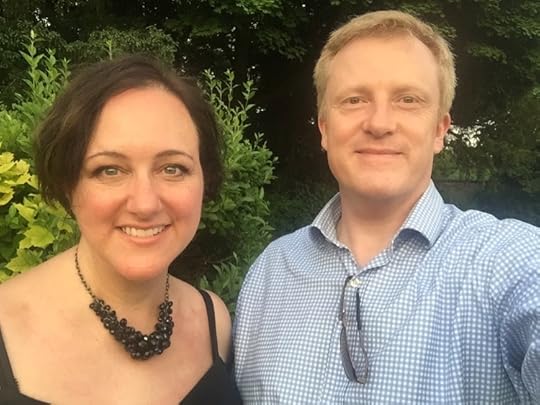
Honey, lift up the camera a little. It will be more flattering.

Not that much! ha ha
The post A Jam-Packed, Joy-Filled Life appeared first on A Lady In France.
May 22, 2017
Two French Chefs & Brunch in the 7th
When my husband’s colleague came into Paris for a few days of team-building, one of the things they wanted to do was take a cooking class (and eat really good food). I’m lucky enough to have the connections to set such a thing up.
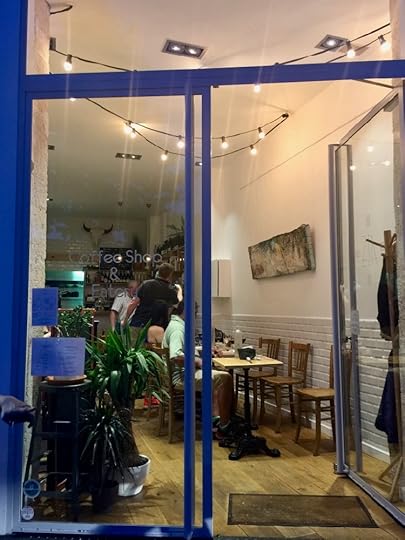
Didier Quémener – aka Chef Q – proposed a cooking demonstration for the group of 14 people (recipes included), plus an elaborate, exquisite meal. This took place in the intimate Café Zia, owned by his friend Justin Kent. They brought us into the tiny kitchen in small groups to see how things were being prepared. (Sorry for the picture quality – the lighting was not great).
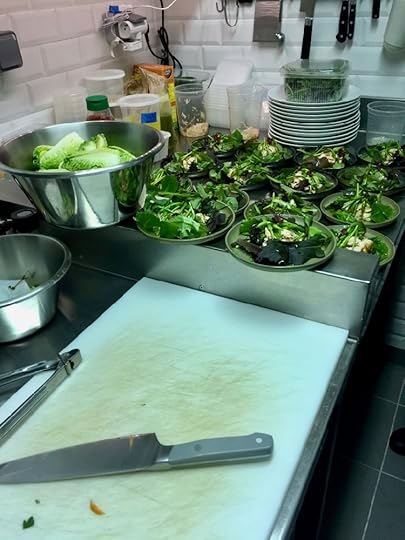
We started out with a salad comprising wild asparagus (tiny little stems that have the head of an asparagus and that are only in season for a very short time), poached, then broiled salmon, mesclun and a Bois Boudran sauce, which we learned how to make.
Bois Boudran is a sauce that was created (by accident) by Chef Michel Roux and has crazy ingredients – shallots, canola oil, vinegar, ketchup, worcetshire sauce, and a splash of Tobasco.
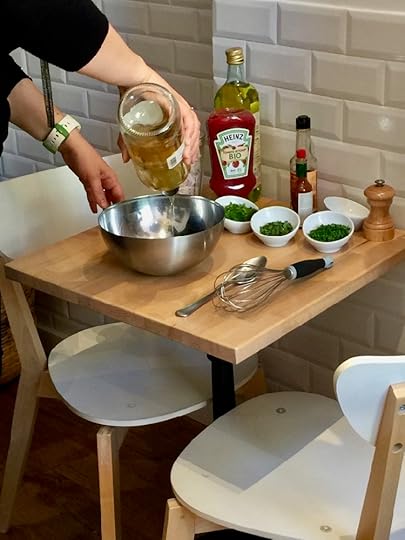
… or several splashes, depending on who’s in charge. The herbs that complete this strange (and delightful combination) are chervil, mint, and chives. The final taste was ah.ma.zing!
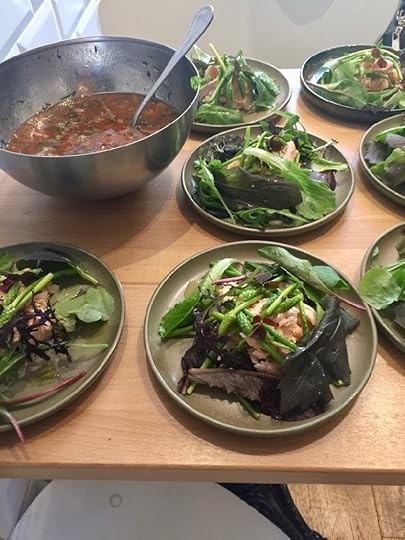
For the dinner part, we had a delicious beef medallion with a béarnaise sauce (which we learned how to make). This is a hollandaise sauce with tarragon. Served with that were new potatoes from Ile de Ré that are also seasonal plus braised sucrine, which is basically grilled lettuce, but tastes way better than it sounds.
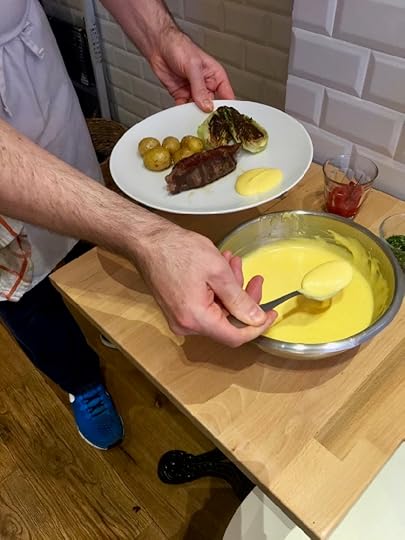
Didier let us choose whether to make the traditional béarnaise sauce or add tomato paste to make it Choron or mint to make it Paloise.
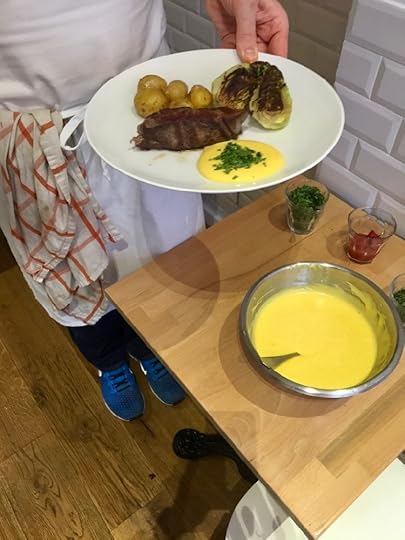
Yum! I stuck with the traditional béarnaise and was not sorry.
For dessert, there were homemade berry meringues (a thoughtful touch for those of us who can’t eat gluten), fresh seasonal berries – and a berry coulis that was made out of those fresh berries, homemade yoghurt ice cream, and mint-infused whipped cream that allowed us to make towering creations (I mean, delicate assortments) in our bowls. There was also pistachio cake, which had wheat flour so I didn’t taste that.
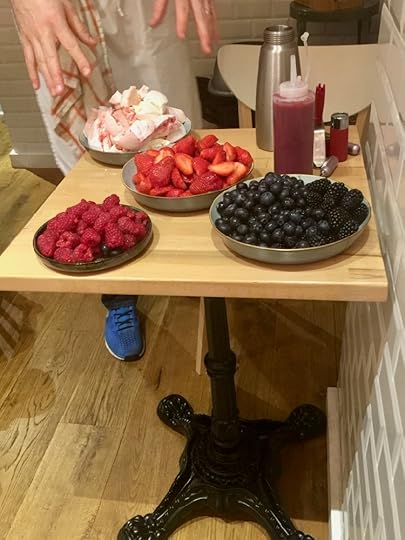
Pure happiness!
Didier is French & naturalised American so he’s perfectly bilingual but speaks English with a French accent. He proposes a variety of culinary services from coming to your place to cook for you, to wine and champagne tours, to market tours to cooking classes. You can find out more on his website here. And if you have no immediate plans to be in Paris, check out the two cookbooks he has out (link on the website).
Justin is American (father) – French (mother), is also perfectly bilingual but speaks French with an American accent, and owns Zia Café. This café is located in the 7th arrondissement (22 Avenue de Tourville 75007 Paris. Phone: 01 44 18 90 71) and is all about brunch and seasonal food, organic whenever possible. They create picnics to go and serve brunch morning to night Wednesdays through Sunday. You’ll want to make a reservation if you plan to go on the weekend. You can read all about his café here.
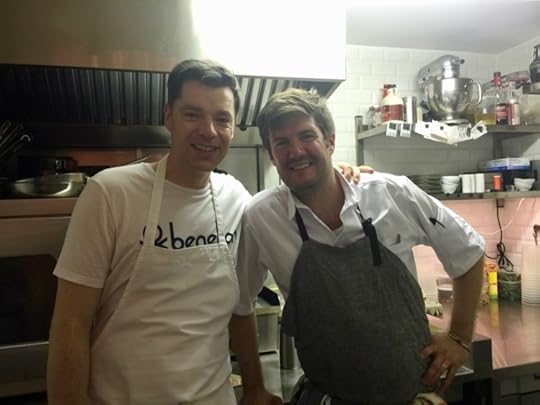
Didier and Justin
The whole experience was delightful from the fun chefs to the delicious food and all those cooking tips we picked up on the way. I hope you get a chance to meet them and taste their cooking some day soon.

If you’d like to read more posts on places to visit in France, click here for my tourism page.
The post Two French Chefs & Brunch in the 7th appeared first on A Lady In France.
May 17, 2017
An Opera Garnier Experience
I have always wanted to go to a concert at Opéra Garnier. If I had a bucket list, this would be on it. So when we went to our marriage retreat and got the little jars to fill out with date ideas, I stuck a slip of paper with Opera Garnier inside. We pulled the slip out in April.
Of course everything was sold out for that month, but I discovered that the website has a classifieds section specifically for people who want to buy and sell their opera tickets. It’s all done officially so there’s no threat of losing your money to a scam. We booked the first date we could that corresponded with my in-laws being able to take the kids.
It was all very exciting. Drive up to the opera and find a good parking spot? Check!

Eat dinner in an over-priced for mediocre food in an Art Deco restaurant that caters to the opera crowd? Check!
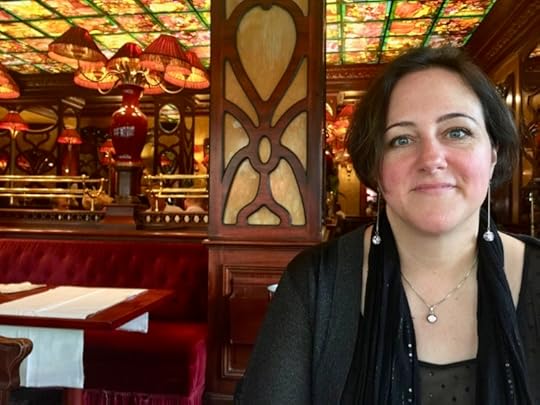
Selfie in front of the famous facade? Check!
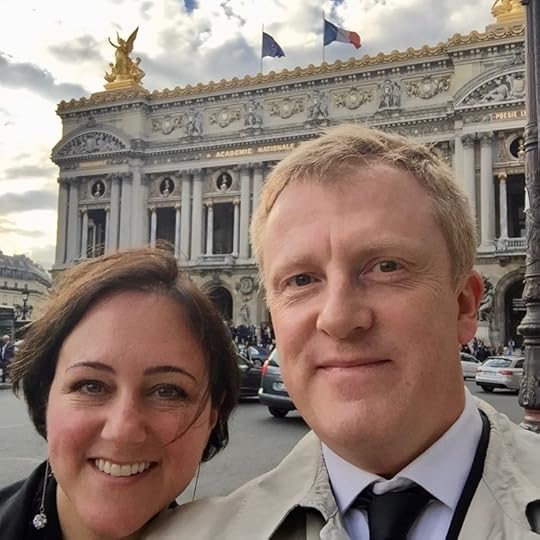
Wait in line to go through the metal detector? Check!
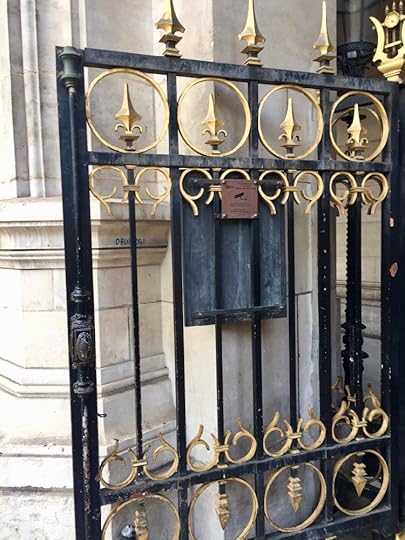
Approach the marble staircase.
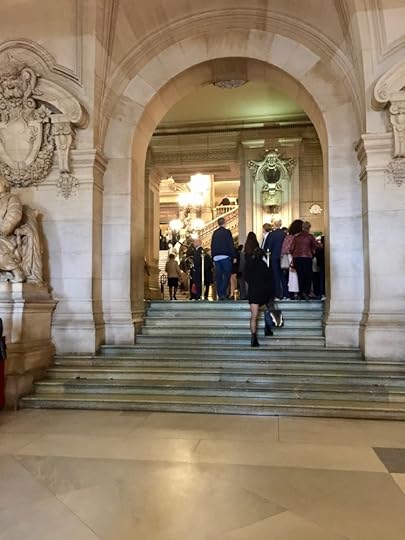
There are statues and gilded facade everywhere you look.

There are people elegantly dressed and those less so, though at one time you couldn’t enter the Opera if you didn’t have a suit and tie. My mother-in-law went with her godfather when she was a teenager and she saw Charles de Gaulle there and was introduced to his prime minister. Her godfather knew people.
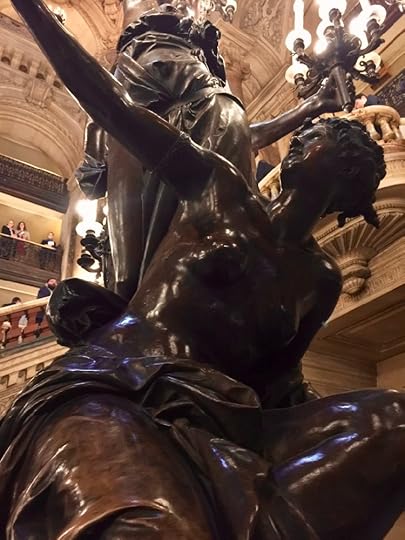
We had seating in the orchestra section, or … le baignoire. The bathtub!
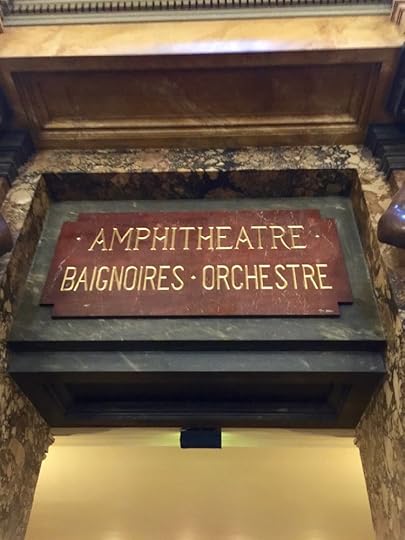
I think that’s normally good seating because you’re right up close, but there were a few problems with it. For one thing, (and I assume it’s like that even in the balcony), the 1875 auditorium has rows of seats that are squashed one against the other so that your nose is in the hair of the person in front of you (and the seat is directly in front of you and not spaced so you can actually see anything). For another thing, the aisle is soon swallowed up. More on that in a minute.
The Opéra Garnier is brilliant. Private box seats on both sides.

Rows that quickly fill up with the opera-going crowd.
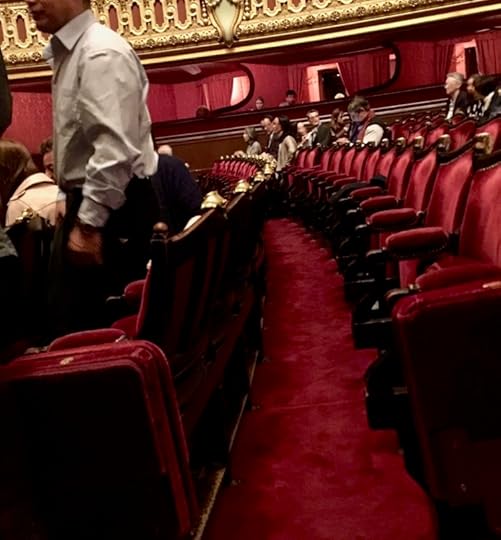
Rows in the balcony behind.

An elaborately painted screen for the curtain.

A painting by Chagal on the ceiling.

Everything was arranged to charm. However, when it was time for the ballet to start, the people still standing in the aisle pulled out the folding chairs attached to the end of the aisle and sat down. When you pull the chairs out and swivel them to face the front, there goes the aisle! There is no emergency exit, and definitely no way to get to the bathroom without creating a stir. Just rows upon rows of chairs that extend from one wall to the other.
I spent the first half-hour of the concert trying to calm my claustrophobic hyperventilating.
And then there was that big head perched right in front of me. He smelled like hair. Not very clean hair. And he filled my entire field of vision so I had to crane my head to see what was going on. Perhaps that was just as well because once the ballet started, I quickly saw I would hate it.
It was one of those contemporary ballets where everyone wears coloured leotards head to toe and there’s no music, only weird sounds and random talking that’s supposed to tell a story, but heaven only knows what. They just moved in weird supposed storytelling movements amid plastic decorations and we all scratched our heads and pretended to enjoy it in the name of art. This went on for an hour.
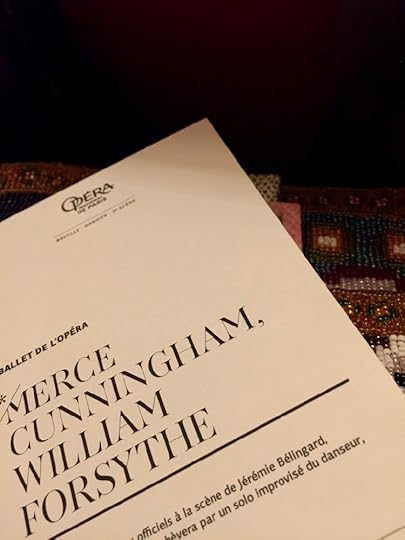
Of course I couldn’t really see what they were doing around the big head, but a few limbs appeared on either side of the black oblong shape. I don’t feel like I missed out. The only bright spot was when Matthieu reached over to squeeze my hand in the middle of the ballet because he knew how much I hated it.
The second act promised Beethoven, so I was all excited, except that it was more of the same contemporary with the three dancers showing their boo-boos (elbow, knee, shoulder) for 20 minutes, set to a few measures of Beethoven on loop. And there were two more things after that.
We didn’t stick around for the third act even though the tickets were expensive. As we ran towards the exit, hand in hand, scarves floating in the wind, the security at the exit asked if we were leaving définitivement. And we’re like, oh yeah!
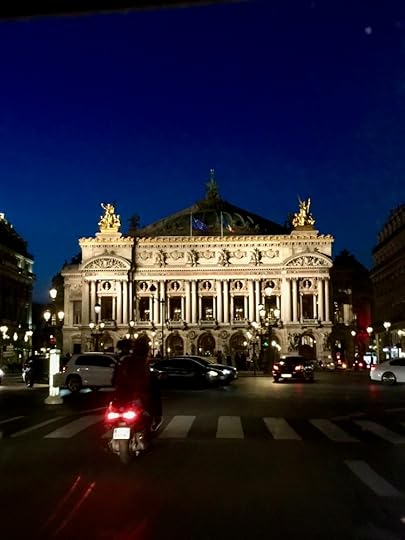
This is us playing hookey.
Opéra Garnier is a neat experience. But if you go, pay extra and get a box seat so you can get in and out of there easily and you have a decent view of the stage.
And shoot for something like Puccini.

If you want to read about other tourist sites in and around France, visit my tourism page.
The post An Opera Garnier Experience appeared first on A Lady In France.
May 10, 2017
Beef Wellington Recipe
What is beef Wellington? Ha! I had no idea what it was until I made filet de boeuf en croûte and my Australian rugby friend came over and said, “Oh! beef Wellington!”
Oooooh! So that’s what it is.
Beef Wellington is a beautiful cut of roast beef, enrobed in puff pastry and stuffed with mushrooms. According to British tradition, it’s made with a madeira sauce, but I made the French version instead. I did some research as to the origin of this dish, and from what I can understand from here, Arthur Wellington cannot take credit at all as the dish was not anglicised until the 20th century – and even then, the dish appeared in America.
But who knows. Maybe there was some thread of connection between the two. The Beau coming to Paris after the success at Waterloo, tasting this hearty French dish, demanding that the recipe be procured … one can imagine.
My dish is made with gluten-free puff pastry, which is now available in France. It’s a little chewier and hard to cut than the wheat version, but it serves wonderfully when necessary. If I didn’t have that, this Martha Stewart recipe looks like an easy way to make your own gluten-free puff pastry. If I had access to pre-made gluten-free pie-crust, I would even make the dish with that just to try it.
As for the rest, let’s get to business.

Take your cut of meat from the refrigerator and remove any strings tying it together. This one was a kilo, so 2.2 lbs. Heat some olive oil in a skillet until its very hot, then sear the meat on each of its four sides for about a minute on each side. Don’t overdo it because you want the inside to be pink.
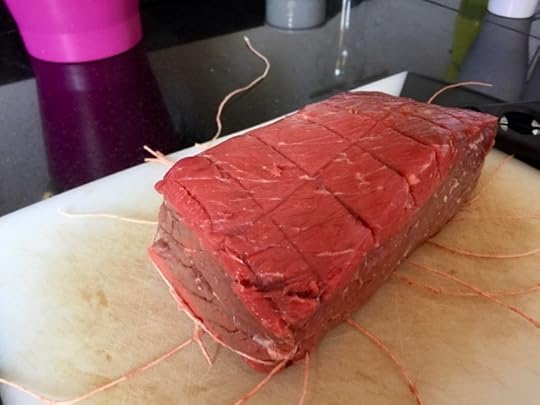
Remove the meat to a rack so it can drain (if necessary) and cool completely. On each of the four sides, sprinkle with salt and thyme, and on just one side, sprinkle with pepper. That adds some flavor, but you don’t want to make it too spicy since we’ll be adding Dijon mustard.
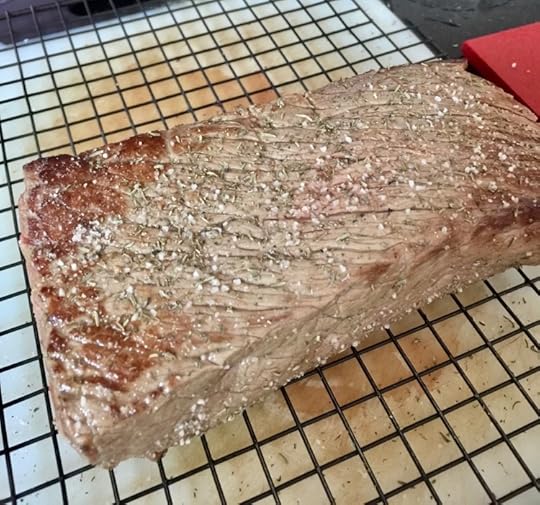
While that’s cooling, chop a quarter of a medium-sized onion and start that cooking in the skillet that you used for the meat. Stir it from time to time as you wash and slice 300 grams of button mushrooms, which comes to loosely 4 cups.
Add 30 grams of butter (a couple of tablespoons) to the skillet and stir in the mushrooms. Cook until dry. There should be no liquid. When it’s ready, mix together in a bowl a heaping tablespoon of sour cream (crème fraîche) and an egg yolk
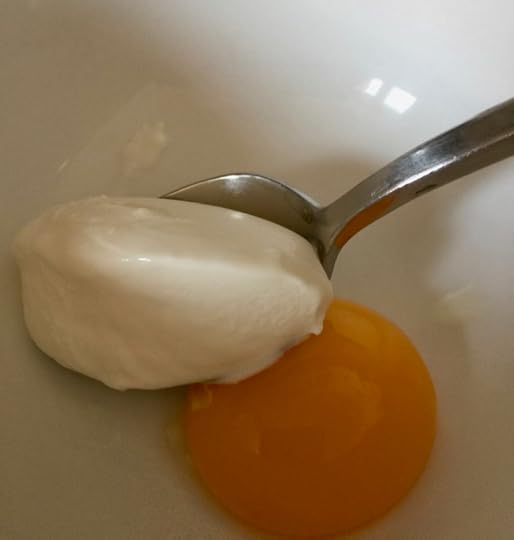
and stir that in to the fried mushrooms.
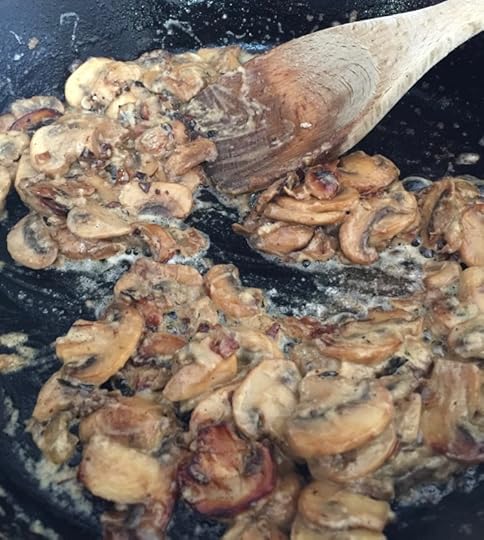
When the mushroom are cooked, put them in the food processor. It makes it easier to spread on the beef. Added bonus – your kids will eat ’em because they won’t really know what they are!
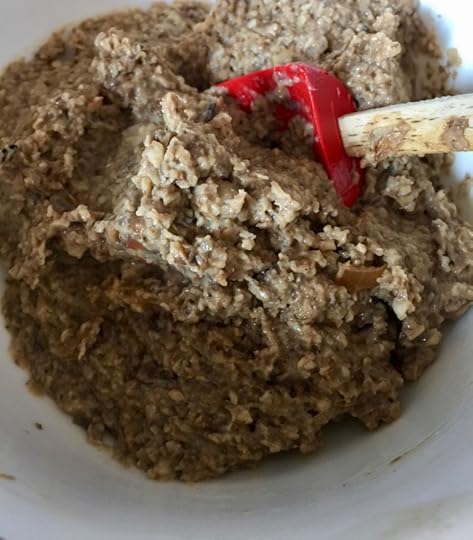
Let those cool and make sure no liquid forms as it cools. If it does, drain it out.
When it’s time to assemble and cook, preheat the oven to 240°C (475°F). It should be super hot so that the dish gets a head-start on cooking for the first 10 minutes. Take a baking sheet and lay a piece of parchment paper on top. Sprinkle some flour on the paper (I used gluten-free, of course), and place your rolled-out dough. You’ll want to spread about a third of the mushrooms on the dough and place your meat on top of that. Then slather it with Dijon mustard.
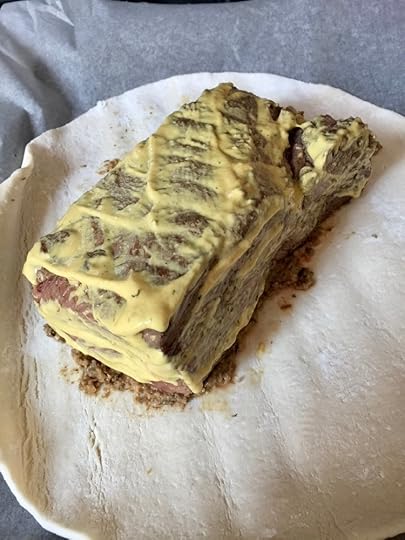
Cover the rest of the sides with the mushroom paste
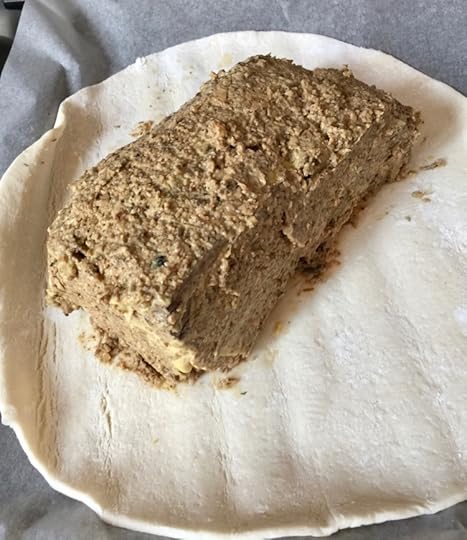 and fold the crust over it. Use some milk to pinch the dough together.
and fold the crust over it. Use some milk to pinch the dough together.
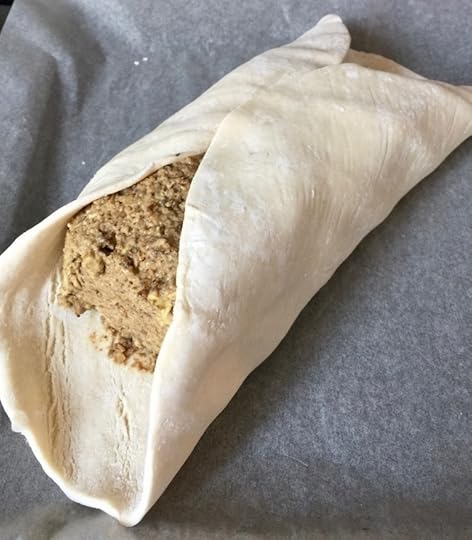
Fold the sides up and cut whatever excess you have. Using milk, continue to pinch the sides together and fill in the holes with the extra crust.

And voila! Turn it upside down (this is where the flour comes in handy. Otherwise the crust will stick to the parchment paper). If you have any excess dough, you can cut some leaves or some other decoration and stick that on with more milk. Brush egg yolk over the entire thing.
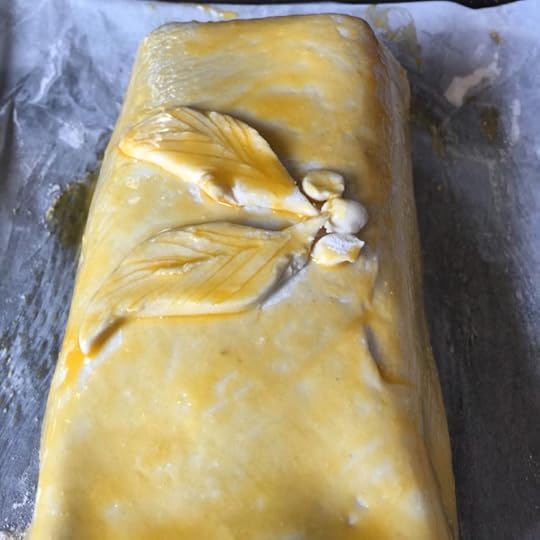
Okay, I gotta be honest. I was so proud of myself at this point, but I was worried about whether the meat would be done to perfection.
Into the oven it goes for those first ten minutes, after which you’re going to turn the temperature down to 190°C (375°F) for the remaining 25 minutes.
Now. Here’s what I did. My oven is a gas oven and I don’t trust my beef not to overcook in those temperatures. I kept it at 190 for about 5 minutes, then got nervous and turned it down to 175°C (around 325°F) for another 10 minutes, checking it to see how it was doing. And the final 10 minutes, I put it at 150°C, or 300°F. If you’ve got an electric oven, I think you can trust the original temperatures given in the recipe I used. But if yours tends to heat hot, I would start like it says, then turn it down throughout the cooking, every 5 or 10 minutes just as I did. Hopefully you know your oven well enough to estimate.
Here it is.

I moved it to a platter and marvelled at it.
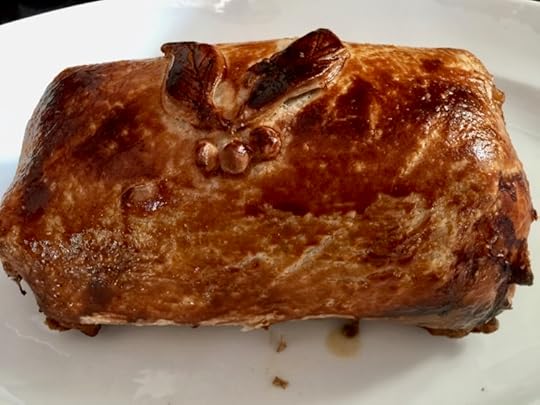
I cut it, and oh darn the gluten-free crust made it hard to have a perfect cut. Next time I do this, I’m going to use a serrated bread knife and try gently to cut the crust, then switch to a sharp meat knife and continue the cut through the meat.
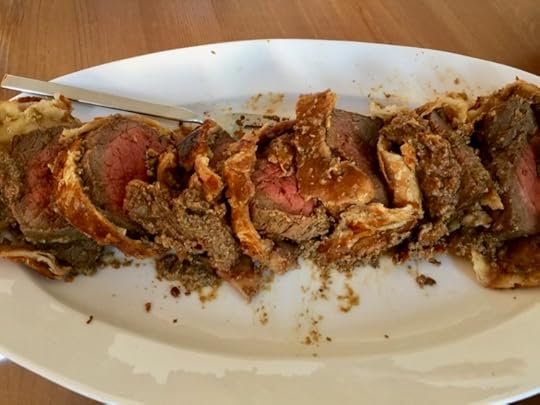
But I was able to mould them together so they were beautiful on the plate.
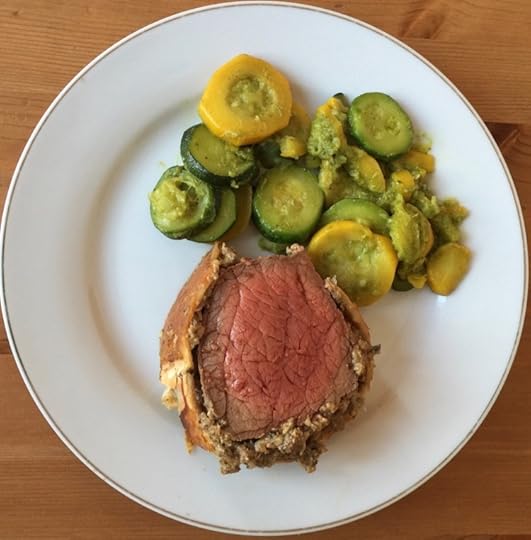
And oh-so-tasty! As you can see, the cuisson (pronounced kwee-sso(w)n) was perfect. Still pink on the inside.
Serve the beef Wellington with stir-fried wild mushrooms (I didn’t, though – didn’t want to push my luck with the kids) – or another type of vegetable. And though you don’t really need it, you can stir-fry some potatoes with the rest of the onion and serve that too. That’s what I did for the kids, who ate every drop of every thing on their plate.
I got the French base for my recipe here.
 A reminder that The Viscount of Maisons-Laffitte is on sale for .99 this week on Amazon US, Amazon UK, and Amazon Canada if you’re looking for something light and fun (and French) to read.
A reminder that The Viscount of Maisons-Laffitte is on sale for .99 this week on Amazon US, Amazon UK, and Amazon Canada if you’re looking for something light and fun (and French) to read.
Beef Wellington Recipe Print Prep time 1 hour Cook time 35 mins Total time 1 hour 35 mins Recipe type: Main Dish Serves: 6 Ingredients 1 rolled puff pastry (not sweet) 1 roast beef around 2 lbs 300 g button mushrooms - about 4 cups 2 egg yolks - used separately 1 large spoon of sour cream or crème fraîche 30 grams of butter, or a couple tablespoons ¼ onion 2 tablespoons Dijon mustard salt, pepper, thyme to taste olive oil for frying Instructions First remove any strings from the meat and fry it on a very hot skillet with some olive oil. No more than a minute on each of its four sides. Let it drain and cool, then sprinkle all sides with salt, pepper (just one side), & thyme. Chop a quarter-onion and stir-fry it in the skillet which held the meat. Wash and slice the mushrooms. Add the butter, then the mushrooms to the pan. Mix the sour cream and egg yolk and add that. There should be no liquid in the mushroom mix. Purée the mushrooms and let them cool. Take a baking sheet and lay parchment paper on top, sprinkle with flour. Spread ⅓ of the cooled mushrooms on top of that. Place the meat on top and cover it with Dijon mustard. Spread the rest of the mushrooms on all sides of the meat. Fold the dough over it on all sides and pinch the dough together with milk. Cut off any extra and fill in the empty spaces with dough, and turn the dish over. If you have enough dough for decorations, do that and attach it with milk. Otherwise, brush yolk over the whole thing. Preheat the oven to 240°C (475°F). Cook the Wellington at that temperature for 10 minutes. Turn the oven down to 190°C (375°F) and cook for 25 more minutes. See my post if you think it might be too hot for your oven. Serve with wild mushrooms or potatoes or vegetables or all three. 3.5.3226
For other French recipes by A Lady in France, click here.
The post Beef Wellington Recipe appeared first on A Lady In France.
May 6, 2017
Works-In-Progress
Hi everyone. I hadn’t intended to post today but in sorting out my e-mail subscriber situation, it said an e-mail would be sent out at 4AM my time and I wanted to make sure it wasn’t a duplicate post of Monet’s garden. (Oh, I hope it works this time!)
If my posts are less frequent overall, I wanted to assure you I am still writing. In fact, I thought I’d include two excerpts here of my latest work. The first is probably longer than it should be because – how many of you read French? Do any of you read French?
I’m working with someone to translate my memoir, Stars Upside Down. She does 7 chapters at a time and sends them to me, I read and make notes, then we get together and discuss it all over lunch. It’s so lovely – no, poignant and magical – to see my words in French. I cried when I read the first chapter out loud to my husband.
So here is the translated last bit of Chapter Six, a part of the book that is very dear to me. If you don’t understand it, feel free to skim down to the English part below:

Elva, mon ancienne assistante, bien qu’ayant déménagé à Taipei, faisait toujours partie de ma vie. Un week-end, elle est venue me voir et m’a emmenée dans les montagnes. J’adorais rouler en mobylette. Grisée par la vitesse en dépassant les gens et en filant le long des paysages, je me sentais libre. Comme le port du casque n’était pas obligatoire et qu’il m’importait peu de survivre ou non à une chute, j’ai laissé le vent s’engouffrer dans ma chevelure et tourbillonner le long de mon corps. Je voulais qu’il arrache la douleur de ma poitrine.
Nous avons d’abord roulé dans les rues familières, bondées, encombrées de marchands bruyants poussant leur marchandise à chaque coin de rue. Nous nous arrêtions aux feux rouges, perdues au milieu d’une armée de motos, les épais nuages blancs des pots d’échappement montant jusqu’au premier étage des immeubles alentour. Puis, la chaussée s’est élargie et nous avons commencé à apercevoir de plus en plus la campagne. Nous avons roulé comme ça pendant plus d’une heure jusqu’à ce qu’enfin, au loin, les montagnes apparaissent.
Nous avons emprunté la large route droite qui traversait les rizières avant d’aborder la montagne. Les virages faisaient s’incliner nos corps d’un côté puis de l’autre au fur et à mesure de notre ascension. Nous avons trouvé un petit espace de terre battue au bord de la route pour nous garer. Dès que le moteur a été coupé, le calme de l’endroit m’a frappée. Il n’y avait personne à part nous.
Nos paniers à la main, nous avons commencé à cueillir des litchis sauvages sur les grands buissons du bord de la route, essayant d’atteindre toujours plus haut au dessus de nos têtes les fruits les plus gros et les plus juteux. Nous nous arrêtions pour peler la peau rose et cartonneuse d’un fruit et sentir son goût douceâtre avant de recracher le noyau lisse et brun, les doigts collants de jus. Une fois nos paniers pleins, nous avons repris la route jusqu’à un large torrent qui dévalait la montagne en sinuant. En son milieu, deux larges rochers dépassant du courant impétueux nous invitaient à nous asseoir.
Des pierres rondes plus petites formant un passage dans le courant nous ont permis d’atteindre en sautillant les rochers du milieu. Là, nous avons papoté, tout en regardant nos coques de litchis vides flotter le long du courant. Quand le soleil a commencé à baisser, la fraîcheur de l’air et la lumière déclinante nous ont finalement fait sortir de notre rêverie. Une fois debout, nous avons retrouvé notre équilibre pour retraverser le torrent sur les pierres et reprendre nos affaires pour rentrer.
Je n’oublierai jamais cette journée dans la montagne, ce jour où les paysages et les sentiments m’étaient si étrangers qu’il me semblait vivre momentanément la vie de quelqu’un d’autre, ce jour où j’ai essayé d’échapper à ma douleur.
Je nous revois, faisant soudain face à la montagne, parcourant librement le dédale de routes jaunes dans une mer de riz doré qui ondulait dans le soleil à perte de vue. L’image de ce soleil brillant, de ce ciel bleu, du riz d’or et des montagnes vertes et brunes au loin, et moi, volant, m’envolant au milieu de tout cela… je crois que cette scène restera gravée dans ma mémoire avec ses couleurs éclatantes jusqu’à mon dernier jour.

So that is the latest news concerning the memoir. Have you wondered about the Regency I’ve been working on for over a year? Well! I’m nearing the end of my first round of edits on the entire thing so that is a huge accomplishment. I’ll soon be entering into 3d draft status. But the story arc and character development still needs tons of work. Fortunately, I have good beta writer friends willing to fill it with red ink and improve it beyond measure.
Never mind. I have to start somewhere. Here’s my 2nd draft edit on the scene I worked on yesterday.

The major followed and lay his hand on Stratford’s arm. “Worthing, wait,” he said. The earl turned and felt the impulse to give him a snub, but he resisted and stayed to see what he would say. “You cannot think she is guilty of everything they’re saying,” the major said.
“I have no reason to disbelieve it, coming from two separate sources.” He stood impatiently.
“Perhaps it will influence your judgment if I tell you Miss Broadmore was in concert with Louisa Price in spreading the rumor.”
The earl turned, an arrested look in his eyes. “This came from Miss Broadmore?”
“I don’t know where she got her sources, but I overheard several people say Miss Broadmore was the one who told them. I’m not in reconnaissance for nothing.” The major gave a wry smile. “Come. Admit that perhaps it has something to do with jealousy.”
The earl considered it, and said, “Perhaps. But this story of her climbing into the dormitory in the middle of the night … surely Miss Price had no benefit in spreading such a tale if it were not true.”
“Forgive my presumption, my lord, but you don’t understand women.” The major turned as Lydia and Emily came up to them. Lydia’s face was white and she was controlling herself with difficulty.
“Stratford, may I have a word with you in private.” The earl started forward as she gave a half-turn, but she faced the major and added, “Mr. Fitzwilliams, if you will be so good as to come, I’d like you to hear this story too.”
They found an unoccupied room off the corridor on the first floor. Stratford went in, followed by the major. “Emily already knows,” Lydia said, “and Anna you may as well hear this too.”
When the entire party was assembled in the room, Lydia spoke. “Stratford, you know how I was when my father died. He always made me feel special. He was the only one in the family to show me affection. Usually I was foisted off on the nurse, but when he was around, he would spend hours talking to me. After he died, I had no one. Of course, I don’t blame Freddy now, for I can see he has quite his share of burdens that come from running the estate. But I held it against him at the time.”
She paused, and her lack of reproaching—or even mentioning—her mother was felt by everyone. “I fell into a dark place when Papa died, and I didn’t want to do anything anymore. That’s when my mother dismissed the nurse, who she said had put tragical notions in my head by reading too many novels, and sent me to school where I met Eleanor.
“Eleanor was good to me. She never complained about her situation and I know it was difficult for her to have lost her father then have her mother run off and marry someone, and leave her behind. I began to cheer up around her and try and pay attention in my studies. Only …”
She continued with difficulty. “The Latin teacher was most attentive, and I fear he saw in me an easy prey. He convinced me to run away with him, and he was charming, and older, and I… I was weak and I agreed to it. I confided in Eleanor and she dissuaded me most earnestly to turn from what she said would be a ruinous path. I didn’t listen to her, and she locked us both in the room and pocketed the key. When I threatened to scream or grab it from her, she told me to go ahead, but she put one foot over the windowsill and began to climb down. She knew I was terrified of heights.
“I was mad enough that I could have screamed just to make sure she got caught. Except that I thought it would all come out that I was the one who was going to elope. I have an inheritance and they would have no trouble believing it was me.”
“Why didn’t she stay in the room with you? Why did she need to climb out the window?” Stratford paced the room, angry with Lydia for being selfish, angry with himself for believing something against Eleanor, angry with the Latin teacher for seducing innocent girls.
“Because the Latin teacher said he would wait for me at the same place and same time every night until I came. He knew it was not easy to get away when one wanted to and he was determined that I would eventually come. She thought the best way to get rid of him was to go in my place and say I was not interested. Except…”
“Except he took her with him,” the major finished.
“Yes.” Lydia looked at him for the first time, blushing but refusing to look away. “And she never told me how she got away. I only know she did because I heard her creep back into our room in the middle of the night.” She lowered her eyes. “I was so angry I didn’t speak to her for the entire week before we left on Christmas break. And by the end of the break, I had realised the extent of my folly and begged Eleanor’s forgiveness. She forgave me instantly.”
Anna darted a look at her brother and said, “Was she able to escape with her virtue intact?”
“Anna,” Emily admonished quietly.
“It’s a fair question,” Anna protested. “Perhaps, through no fault of her own, there is some substance to the rumours.”
Stratford’s jaw worked furiously. He spun around and strode to the fireplace, then turned and came back to the group. He was just in time to hear Lydia say in a succinct voice, “Eleanor has no cause to blush.”

So those are my works-in-progress. It’s slow-going for sure, and it means my blog posts are a little on the light side, but I love the idea that I’m always moving towards a completed novel. (Two books, if you include the memoir in French).

It’s a little early to announce this, but if you haven’t had a chance to read my clean, modern romance that just had its one-year anniversary, The Viscount of Maisons-Laffitte will be on sale for .99 on Amazon US, Amazon UK, and in Canada. (Click the pink for the link). The sale begins Monday, May 8 and lasts though Sunday.
The post Works-In-Progress appeared first on A Lady In France.
May 1, 2017
Monet’s House in Giverney
Claude Monet’s house is located in the small town of Giverny, about an hour outside of Paris. If you want information on how to access the house, click here.
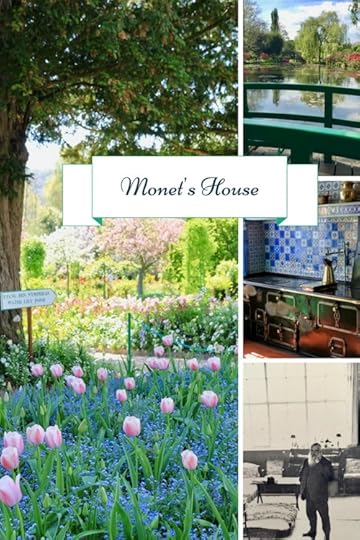
We went on a perfect, sunny spring day so it was not surprising that the place was packed and the line to get in was about an hour long. I suspect they do crowd control when there are that many people, and only allow people to come in when others leave.
I think Giverny would be a quiet, forgotten town if it weren’t for the Claude Monet Foundation. This is what the rest of the town is like:
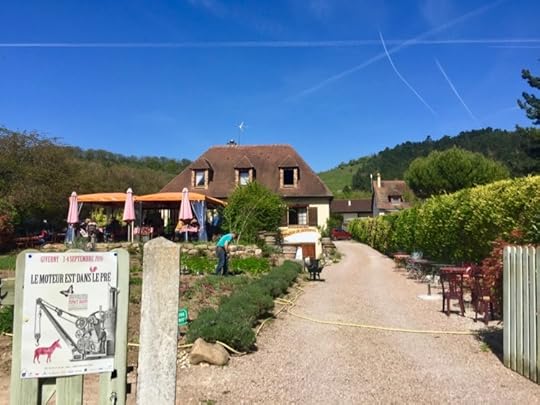
But that just goes to show that it doesn’t matter where you live. You can turn your space into something beautiful and memorable.
This will be a picture-heavy, text-light post. You don’t go to Monet’s house to learn; you go to soak in the beauty and be inspired.
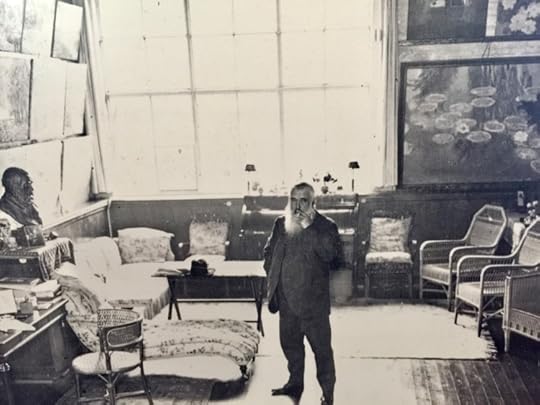
I hope you’re inspired. 
April 27, 2017
A Post-It Type Post
My blog has been down for a few days, and my author website (jenniegoutet.com) for even longer. I switched hosts and was again reminded of my lack of comprehension of all things technical. I hadn’t realised that switching hosts meant copying the huge files that represent 7 years of blogging from the old host to the new. I thought it just magically sorted itself out somehow the minute I clicked “pay here”.
It helped me to realise how much I love this dear little blog. I felt empty and panicky when I thought I might not be able fix it, and the 7 years of posts would be lost forever.
I want to share with you some gorgeous photos of Monet’s garden in Giverny, but that will be for next time. This post is just to reassure that you I haven’t closed shop in case any of you tried to find me and came up with nothing. It’s also to test a new “subscribe by e-mail” form I’m working on that’s long overdue. (For those in the know, I’m leaving feedburner and will move to mailchimp). I want to bring over my old e-mail list and give new people the option to subscribe, but first I want to make sure the thing actually works.
So this is my test post. 




